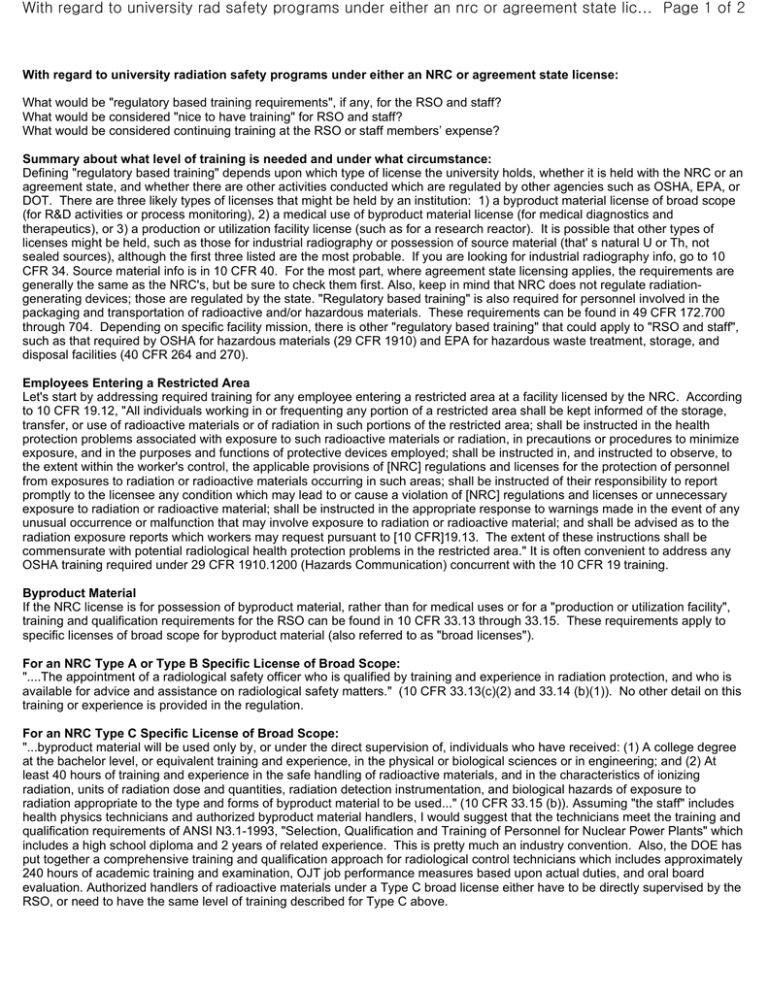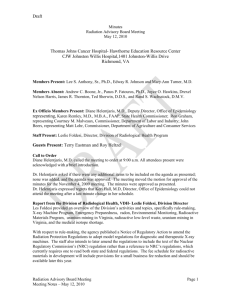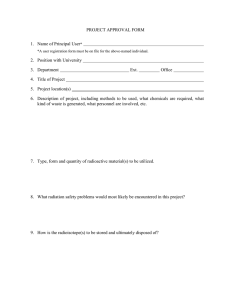Who needs radiation safety training?
advertisement

With regard to university rad safety programs under either an nrc or agreement state lic... Page 1 of 2 With regard to university radiation safety programs under either an NRC or agreement state license: What would be "regulatory based training requirements", if any, for the RSO and staff? What would be considered "nice to have training" for RSO and staff? What would be considered continuing training at the RSO or staff members’ expense? Summary about what level of training is needed and under what circumstance: Defining "regulatory based training" depends upon which type of license the university holds, whether it is held with the NRC or an agreement state, and whether there are other activities conducted which are regulated by other agencies such as OSHA, EPA, or DOT. There are three likely types of licenses that might be held by an institution: 1) a byproduct material license of broad scope (for R&D activities or process monitoring), 2) a medical use of byproduct material license (for medical diagnostics and therapeutics), or 3) a production or utilization facility license (such as for a research reactor). It is possible that other types of licenses might be held, such as those for industrial radiography or possession of source material (that' s natural U or Th, not sealed sources), although the first three listed are the most probable. If you are looking for industrial radiography info, go to 10 CFR 34. Source material info is in 10 CFR 40. For the most part, where agreement state licensing applies, the requirements are generally the same as the NRC's, but be sure to check them first. Also, keep in mind that NRC does not regulate radiationgenerating devices; those are regulated by the state. "Regulatory based training" is also required for personnel involved in the packaging and transportation of radioactive and/or hazardous materials. These requirements can be found in 49 CFR 172.700 through 704. Depending on specific facility mission, there is other "regulatory based training" that could apply to "RSO and staff", such as that required by OSHA for hazardous materials (29 CFR 1910) and EPA for hazardous waste treatment, storage, and disposal facilities (40 CFR 264 and 270). Employees Entering a Restricted Area Let's start by addressing required training for any employee entering a restricted area at a facility licensed by the NRC. According to 10 CFR 19.12, "All individuals working in or frequenting any portion of a restricted area shall be kept informed of the storage, transfer, or use of radioactive materials or of radiation in such portions of the restricted area; shall be instructed in the health protection problems associated with exposure to such radioactive materials or radiation, in precautions or procedures to minimize exposure, and in the purposes and functions of protective devices employed; shall be instructed in, and instructed to observe, to the extent within the worker's control, the applicable provisions of [NRC] regulations and licenses for the protection of personnel from exposures to radiation or radioactive materials occurring in such areas; shall be instructed of their responsibility to report promptly to the licensee any condition which may lead to or cause a violation of [NRC] regulations and licenses or unnecessary exposure to radiation or radioactive material; shall be instructed in the appropriate response to warnings made in the event of any unusual occurrence or malfunction that may involve exposure to radiation or radioactive material; and shall be advised as to the radiation exposure reports which workers may request pursuant to [10 CFR]19.13. The extent of these instructions shall be commensurate with potential radiological health protection problems in the restricted area." It is often convenient to address any OSHA training required under 29 CFR 1910.1200 (Hazards Communication) concurrent with the 10 CFR 19 training. Byproduct Material If the NRC license is for possession of byproduct material, rather than for medical uses or for a "production or utilization facility", training and qualification requirements for the RSO can be found in 10 CFR 33.13 through 33.15. These requirements apply to specific licenses of broad scope for byproduct material (also referred to as "broad licenses"). For an NRC Type A or Type B Specific License of Broad Scope: "....The appointment of a radiological safety officer who is qualified by training and experience in radiation protection, and who is available for advice and assistance on radiological safety matters." (10 CFR 33.13(c)(2) and 33.14 (b)(1)). No other detail on this training or experience is provided in the regulation. For an NRC Type C Specific License of Broad Scope: "...byproduct material will be used only by, or under the direct supervision of, individuals who have received: (1) A college degree at the bachelor level, or equivalent training and experience, in the physical or biological sciences or in engineering; and (2) At least 40 hours of training and experience in the safe handling of radioactive materials, and in the characteristics of ionizing radiation, units of radiation dose and quantities, radiation detection instrumentation, and biological hazards of exposure to radiation appropriate to the type and forms of byproduct material to be used..." (10 CFR 33.15 (b)). Assuming "the staff" includes health physics technicians and authorized byproduct material handlers, I would suggest that the technicians meet the training and qualification requirements of ANSI N3.1-1993, "Selection, Qualification and Training of Personnel for Nuclear Power Plants" which includes a high school diploma and 2 years of related experience. This is pretty much an industry convention. Also, the DOE has put together a comprehensive training and qualification approach for radiological control technicians which includes approximately 240 hours of academic training and examination, OJT job performance measures based upon actual duties, and oral board evaluation. Authorized handlers of radioactive materials under a Type C broad license either have to be directly supervised by the RSO, or need to have the same level of training described for Type C above. With regard to university rad safety programs under either an nrc or agreement state lic... Page 2 of 2 Medical Use of Byproduct Material 10 CFR 35 applies to medical use of byproduct material, but does not except the licensee from complying with any requirements of 10 CFR 19,20,21,30, or 71. Part 35 is probably the most specific of all the NRC regulations with regard to the "Radiation Safety Officer" title and to what the specific training and qualification requirements are. There are also specific training requirements for authorized radiopharmaceutical users for a variety of medical procedures in Parts 35.910 through 960, and for teletherapy physicists and physicians in Part 35.961 through 971. The training requirements for the RSO under Part 35.900 are as follows: "...the licensee shall require an individual fulfilling the responsibilities of the Radiation Safety Officer as provided in 35.32 to be an individual who: (a) is certified by: (1) American Board of Health Physics in Comprehensive Health Physics; (2) American Board of Radiology; (3) American Board of Nuclear Medicine; (4) American Board of Science in Nuclear Medicine; or (5) Board of Pharmaceutical Specialties in Nuclear Pharmacy; or (b) Has had classroom and laboratory training and experience as follows: (1) 200 hours of classroom and laboratory training that includes: (i) Radiation physics and instrumentation; (ii) Radiation protection; (iii) Mathematics pertaining to the use and measurement of radioactivity; (iv) Radiation biology; and (v) Radiopharmaceutical chemistry; and (2) One year of full time experience as a radiation safety technologist at a medical institution under the supervision of the individual identified as the Radiation Safety Officer on a [NRC] or Agreement State license that authorizes the medical use of byproduct material; or (c) be an authorized user identified on the licensee's license." University Reactors It is most likely that if there is a reactor at the institution it is licensed under a "Class 104” license (see 10 CFR 50.21). All personnel entering a restricted area at these facilities would still need to be trained in accordance with the 10 CFR 19 requirements listed above. Also, if there is a byproduct materials license for the operation, those requirements apply as well. Training requirements don't "kick in" for health physics personnel at these reactors until they are used for commercial or industrial purposes (defined as more than 50% of the annual cost of owning or operating the facility devoted to the production of materials, products or energy for sale or commercial distribution). As far as the "RSO and staff" in these cases, the licensee shall establish, implement, and maintain a training program derived from a systems approach to training for radiological protection technicians, in addition to a number of other staff positions. There is not a definition of RSO or RPM in Part 50. The systems approach to training is described in 10 CFR 55.4. "Nice to Have" Training This type of training would include cross training for other job positions or for professional certifications such as NRRPT, ABHP, IHMM, ABIH, or BCSP. There are a number of commercially available training programs to prepare candidates for these certifications. These may be conventional classroom sessions or computer-based training. Typically, with budgets like that you have described, computer-based training ends up being more cost-effective and flexible. I also believe, though, that there is no substitute for a live, experienced trainer to motivate students to master skills and achieve objectives. If your facility is in a state of downsizing, a good thing to do for personnel is to prepare them for related careers in other industries. This might include power reactor health physics training for medical HP personnel, or vice-versa. Perhaps industrial hygiene training for HP technicians, or HP training for industrial hygiene technicians. Since this training is neither regulatory required or continuing (unless this type of cross training is part of the continuing training program), would qualify it as "nice-to-have". Continuing Training Continuing training should be a part of any training program, including that for the RSO and staff. Continuing training is more than just "nice-to-have", it is part of a re-qualification process that ensures that personnel have the competency to safely and efficiently perform their jobs. It may be required by certain regulations. Continuing training provides personnel with review of required knowledge/skills, introductions to new knowledge/skills, and lessons learned from industry events and occurrences. Topics to be addressed in continuing training may include selected fundamentals necessary for job performance; off-normal response procedures and drills; new procedures and changes to existing procedures; new or changing regulations or orders; new equipment and changes or modifications to existing equipment or facilities; application of lessons learned from industry operating experiences; identified deficiencies or poor task performance; and items identified as requiring over-training because of high degree of difficulty and/or high consequence for failure to properly perform.


